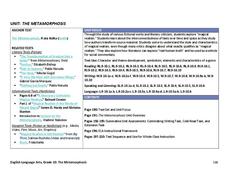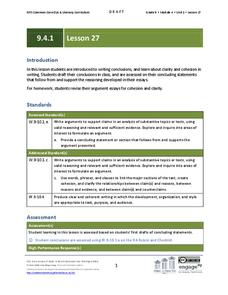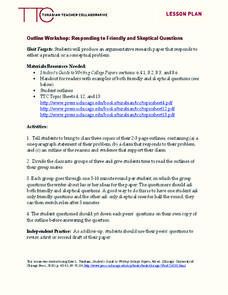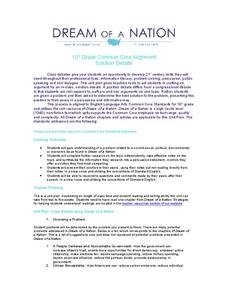PBS
Who, Me? Biased?: Understanding Implicit Bias
A 10-page interactive explains different facets of implicit bias, demonstrates how implicit bias works, and how people can counteract its effects. The interactive tools permit users to save their information in "My Work" folders, to take...
Santa Ana Unified School District
Persuasive Writing
Should students be paid for doing well in school? That is the question at the heart of an argumentative writing unit that walks writers through the steps of crafting a persuasive essay. The carefully scaffolded scripted plans provide...
Louisiana Department of Education
The Metamorphosis
How can something be true even if it didn't happen? Invite your classes to investigate the truths found in the world of magical realism as they analyze short stories, poems, informational texts, video, and art from this genre.
Facing History and Ourselves
Civil Rights Historical Investigations
The murder of Emmett Till, the Selma to Montgomery march, and the desegregation of Boston schools are the focus of three units that ask class members to investigate why these events were so key in the struggle for civil rights....
Maryland Department of Education
The Concept of Diversity in World Literature Lesson 5: The Tragic Hero
Should identifying a tragic hero be based on a universal definition or a definition based on the morals and values of a specific culture? As part of a study of Things Fall Apart, class members read Sylvia Plath's "Colossus" and then...
Shakespeare Uncovered
Women’s Roles in As You Like It
“There is nothing that becommeth a maid better than soberness, silence, shamefastness, and chastity, both of body & mind.” This line, from Thomas Bentley ‘s The Monument of Matrons published in 1582, typifies the way women were...
Common Sense Media
My Online Code
Approach ethical online behavior with a series of activities geared toward teaching pupils about digital citizenship. After a brief discussion about ethics, small groups inspect a fictional social networking profile with ethics in mind....
Academy of American Poets
Poems about Poetry
Learners of all ages hear the words “Today we’re going to start poetry” and begin their plans to drop out of school. It is not the teacher's fault! Use this resource to help young scholars understand the genre of poetry and why it is...
National Woman's History Museum
The Power of Words and Activism: Susan B. Anthony
Where have all the activists gone? Class members compare 21st-century activism with the suffrage movement and the work of Susan B. Anthony. They begin by examining Anthony's biography and speeches to find evidence that her words and...
EngageNY
Grade 10 ELA Module 3: Unit 3, Lesson 10
Can budding writers accept constructive criticism? Learners work with their peers to gain feedback about their argumentative essay drafts. Peers give one another constructive criticism to revise their work better. Using a Peer Review...
EngageNY
Grade 10 ELA Module 3: Unit 3, Lesson 11
It's time to show what you know. Scholars finalize their argumentative essays by making last-minute revisions to conventions, tone, and formal style. Learners review the checklist to ensure they have met all the task requirements. They...
EngageNY
Grade 10 ELA Module 3: Unit 3, Lesson 6
And that's a wrap! Scholars create their concluding statement drafts by examining model text with exemplar conclusions. In pairs, they discuss how transitional words and phrases add to sentence structure and consider how their concluding...
EngageNY
Grade 10 ELA Module 4, Unit 2, Lesson 22
The Witches, Lady Macbeth, or Macbeth himself: who is the culprit? Using the resource, pupils craft multi-paragraph essays to present arguments about which character is responsible for the tragedy in Shakespeare's Macbeth. Additionally,...
EngageNY
Grade 10 ELA Module 4, Unit 2, Lesson 21
Which character bears responsibility for the tragedy in Shakespeare's Macbeth? Scholars participate in a gallery walk and complete a Quick Write to support their claims about which character is to blame.
Prestwick House
Writing Arguments in Response to Nonfiction
Emotional appeal or argument? That is the question. An informative lesson helps your class recognize the difference between a logical argument and an emotional appeal and learn how to craft an argumentative response. Writers develop a...
EngageNY
Grade 9 ELA Module 4, Unit 1, Lesson 29
Writers review the provided essay rubric, edit and rewrite if necessary, polish their work, and then submit their argument essay.
EngageNY
Grade 9 ELA Module 4, Unit 1, Lesson 27
Crafting a clear and cohesive conclusion to any piece of writing is crucial. An effective conclusion restates the central claim in the introduction, briefly summarizes the supporting claims, and presents a new way of thinking about the...
Turabian Teacher Collaborative
Introductions: Formulating Problem Statements
Describing a problem efficiently doesn't solve it, but a well-crafted argument can move readers to action. High schoolers focus on structuring problem statements by reading examples of strong essays and working in groups to create...
Turabian Teacher Collaborative
Outline Workshop: Responding to Friendly and Skeptical Questions
Answering questions is the best way to hone and revise your argument. Foster receptive writers with a workshop activity that promotes peer editing and argumentative writing skills. Given lists of both friendly and skeptical...
Turabian Teacher Collaborative
Parts of Argument III: The Claim Game
Throw down with a fun language arts game! Armed with a hand of writing-themed cards, learners craft arguments based on the strategies written on the cards, dropping cards as they discuss their claims further until there are no strategies...
Turabian Teacher Collaborative
Parts of Argument II: Article Critique
Break down the parts of argumentative writing with a critical thinking activity. High schoolers read an article of your (or their choice), and use a graphic organizer to delineate the ways the author structures his or her arguments.
Turabian Teacher Collaborative
How to Find a Research Question
There are so many fascinating topics and concepts to learn about in the world. But where do you start? Begin formulating questions for an argumentative research paper with a guided practice instructional activity. After coming up with...
Maryland Department of Education
The Concept of Identity Lesson 7: Logical Fallacies
What are the effects of competition in an academic environment? The competition between the main characters in A Separate Peace motivates a series of activities that asks readers to take a stance on competition, and then to develop a...
Dream of a Nation
Solution Debate
Class members choose a current social, political, environmental, or economic problem presented in Tyson Miller's Dream of a Nation: Inspiring Ideas for a Better America, research this problem and a variety of suggested solutions, before...

























